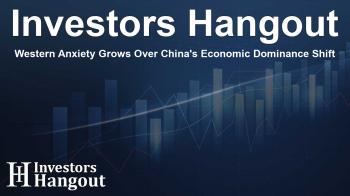Western Anxiety Grows Over China's Economic Dominance Shift

The Rising Influence of China
The fear of China's growing economic leverage is no longer a quiet whisper; it has now become a focal point for policy makers in the West. Governments are racing to contain China's influence not merely because of direct threats, but rather due to its emerging actions that signal a shift in global dynamics.
A Bold Move in the Semiconductor Market
Recently, a significant event occurred when a government seized control of a Chinese-owned chipmaker due to escalating concerns about China's hold on key technologies. This decisive action reflects a mounting urgency among Western nations, who are keenly aware of their dependence on China's technological resources.
Understanding the Background
The backdrop of this situation is characterized by a growing apprehension in Washington. After conveying strong sentiments towards China, a prominent political leader quickly moderated his stance, revealing the complexities of navigating international relations in this new era.
Signals of Economic Warfare
The actions taken by China seem to indicate a move towards a more assertive role in global trade. As the world's second-largest economy, China's capability to influence markets, particularly in semiconductors and advanced technologies, has been increasingly evident. This shift signals a departure from being a passive trade partner to taking a more active role in global economic negotiations.
Western Countries Brace for Impact
The strategies employed by China extend far beyond mere trade initiatives. The government can control critical resources and supply chains, using its influence as leverage in various sectors. Western analysts are now concerned that China's future actions might be more aggressive and calculated than before, which could disrupt international markets significantly.
The Economic Landscape Transformation
This scenario presents an intricate interplay of geopolitics and economics. Countries that previously relied on China's supply chains are now in a state of reassessment, seeking to diverge from dependency and reintegrate production closer to home or within allied regions.
The Tools of Influence
China possesses numerous tools to exert pressure on foreign nations. By tightening export regulations or leveraging its dominance in key industries, it can unilaterally dictate terms that could adversely affect many nations dependent on its resources. The fear of economic repercussions prompts Western governments to strategize and develop frameworks to combat potential economic warfare.
What Lies Ahead?
This evolution is not simply a tale of trade relations; it signifies a broader geopolitical transformation. The apprehension surrounding China's long-term intentions is burgeoning and may indeed be justified. As these dynamics continue to unfold, the strategic recalibrations of Western governments will become increasingly essential to ensure economic stability and security.
Frequently Asked Questions
1. What recent actions have Western governments taken regarding China?
Western governments have begun implementing strategic interventions, such as seizing control of foreign-owned firms, to limit China's influence on critical technologies.
2. What industries are primarily affected by China's economic maneuvers?
The semiconductor and advanced technology industries are particularly impacted by China's increasing economic control and tactics aimed at reshaping trade dynamics.
3. How is China leveraging its market position?
China utilizes its market dominance to impose trade regulations, leverage supply chains, and implement strategic economic pressures without overt threats.
4. What does the fear of China signify for the global economy?
The fear highlights a significant shift in economic power, prompting nations to rethink their dependency on Chinese markets and seek greater autonomy in their production capabilities.
5. Are there long-term implications for Western economies?
Yes, the ongoing strategic recalibrations may lead to increased economic resilience and independence from China, ultimately reshaping global trade landscapes.
About The Author
Contact Thomas Cooper privately here. Or send an email with ATTN: Thomas Cooper as the subject to contact@investorshangout.com.
About Investors Hangout
Investors Hangout is a leading online stock forum for financial discussion and learning, offering a wide range of free tools and resources. It draws in traders of all levels, who exchange market knowledge, investigate trading tactics, and keep an eye on industry developments in real time. Featuring financial articles, stock message boards, quotes, charts, company profiles, and live news updates. Through cooperative learning and a wealth of informational resources, it helps users from novices creating their first portfolios to experts honing their techniques. Join Investors Hangout today: https://investorshangout.com/
The content of this article is based on factual, publicly available information and does not represent legal, financial, or investment advice. Investors Hangout does not offer financial advice, and the author is not a licensed financial advisor. Consult a qualified advisor before making any financial or investment decisions based on this article. This article should not be considered advice to purchase, sell, or hold any securities or other investments. If any of the material provided here is inaccurate, please contact us for corrections.

